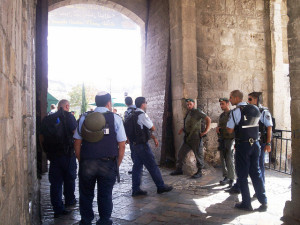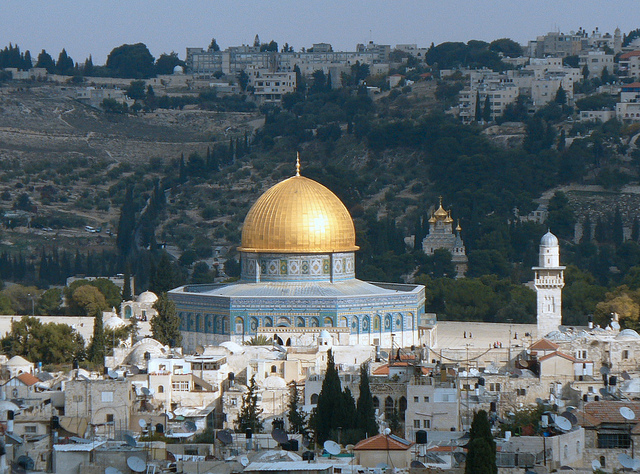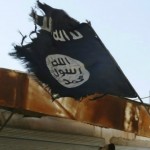by Mitchell Plitnick
Take a particularly provocative and grandstanding Israeli government and shift its focus from Hamas and Gaza to Jerusalem and you have a most explosive recipe. That potion is being stirred now, and the results could shake up the status quo in a way that we have only seen a few times in Israel’s history.
Much of the recent news narrative starts with the wounding of Yehuda Glick, a US expat who emigrated to Israel as child and became one of the leaders of the self-proclaimed “Temple Mount Movement.” In reality, this chapter of the endless and bloody saga of the Old City of Jerusalem began with the last Israeli election. That poll brought into power the most radically right-wing of Israeli governments, representing an odd mixture of zealous Zionism, modern Orthodoxy in Judaism and a curious impulse to completely disregard centuries of Jewish law regarding the Temple Mount. We’ll get back to that later, but first it’s important to recognize the potential fallout from further escalation.
The recall of Jordan’s ambassador to Israel is no small matter, and it reflects just how important this issue is to the Hashemite kingdom. Despite having lost the West Bank to Israel in 1967 and having relinquished its claim to it in 1988, Jordan is still the guardian of the Jerusalem holy sites for the Muslim world. This status is precious to the Hashemites, and the prestige it brings is a crucial element for their continued hold on power.
The Israeli threats have escalated steadily since the election and then ticked up sharply in the spring, when the Netanyahu government began its anti-Hamas crackdown throughout the West Bank, under the false cover of searching for kidnap victims the Israelis already knew had been brutally murdered. Tensions and demonstrations in Jerusalem were escalating throughout the summer, while everyone’s attention was, quite understandably, focused on Gaza.
This was the inevitable result of an intensely nationalistic government believing it had finally done away with the façade of negotiations in which Jerusalem was a central issue. Brazen statements, provocative visits, and then crackdowns and harsher limits on Palestinian worshippers at al-Aqsa Mosque were all to be expected.
One question that these events raise is whether this is the intention of Prime Minister Benjamin Netanyahu or the result of his unwillingness to challenge his coalition partners and members of his own party on a passionately populist issue. I tend to lean toward the latter belief, as Netanyahu has usually shown himself to be the sort of leader who does nothing unless he’s pressured by politics. In either case, the Israeli actions have raised concerns from Washington to Brussels to Cairo and, most resoundingly, to Amman.
Despite the peace treaty with Israel being massively unpopular in Jordan, where the majority of the citizens are Palestinian, it has not been a cause for major internal upheaval. For Jordan, peace has not only brought financial and diplomatic support from the United States, it has also opened up a new market with Israel, which exports goods to Jordan and thereby to the rest of the Arab world, despite the ongoing regional boycott against Israel.
Tinderbox
But now there is unrest and unease in Jordan. King Abdullah’s support of the United States’ efforts against the Islamic State (ISIS or IS) has helped rile some of the more radical elements in Jordan, adding to the tensions that already existed between the government and more mainstream Islamist groups such as the Muslim Brotherhood. The country is undergoing a severe economic crisis, with massive unemployment, even while it is also burdened with refugees from Syria and Iraq, many of whom have sharp complaints about their treatment.
These conditions make Jordan a tinderbox. And Jerusalem is just as sure a fuse for a Jordanian tinderbox as it is for an Israeli-Palestinian one. These are the factors that led King Abdullah to recall his ambassador from Israel. Only once before, when Israel attempted to assassinate Hamas leader Khaled Meshal in Jordan, has peace between Jordan and Israel been so threatened.
The Israelis have surely given this consideration, but they likely estimate that Jordan would not dare abrogate its treaty with Israel. Such a move would surely endanger Jordan’s support from the US, and that could be fatal if, indeed, internal conflict does break out in the Hashemite kingdom. Ultimately, Israel probably believes that unless it tries to threaten the authority of the Islamic Waqf, which is the body that administrates the Temple Mount, or otherwise officially changes the status quo of the area, Jordan will not withdraw from the treaty.
That’s a reasonable assessment, but it should not be banked on too strongly. Given the precarious situation in Jordan, its leadership’s main concern now is avoiding an outbreak of civil conflict altogether. Even though the Jordanian military is far superior to that of, say, Iraq, a popular uprising triggered by conflict over the Jerusalem holy sites could quickly spread to encompass the mass dissatisfaction with both the economic conditions and Hashemite rule in the country in general. Abdullah does not want to gamble on his ability to contain all of that anger. Though unlikely, that concern does give him a reason to potentially take the bold step of ending peace with Israel, and deal with the consequences of that step later.
For Israel, such an outcome would mean near-total isolation again. Even the Sisi government in Egypt would have a difficult time continuing to work with Israel all by itself. Egyptians remember well the isolation they experienced from the rest of the Arab world after their treaty with Israel was first struck. It took a very long time, even after they were re-admitted into the Arab League, for Egypt to regain a position of some stature in the Arab world.
New Path
The entire approach the international community has taken toward Jerusalem needs to re-evaluated, and quickly. For years, Israel has treated Jerusalem as a flashpoint it could manipulate for nationalistic reasons, and for a long time, young Palestinian Muslims (sometimes all of them under the age of 50, other times the cutoff age has been as low as 35) have been unable to go to pray at the al-Aqsa Mosque. To be sure, there have also been many incidents of Palestinians using Friday prayers as a launching pad for protests and stone-throwing, sometimes down the hill at Jewish worshippers at the Western Wall.

Israeli soldiers and police blocking Palestinians from one of the entrances to the old city in Jerusalem on March 14, 2010. Credit: Mel Frykberg/IPS
Now, Jerusalem is being used by different parts of Israel’s governing coalition. The further right elements are crystallizing nationalist fervor around it. Netanyahu, for his part, is using the violence that Israeli actions are stirring up to blame Palestinian Authority (PA) President Mahmoud Abbas as part of his campaign to convince people that all of Israel’s opponents—IS, Iran, Hamas, and the PA as led by Abbas—are essentially the same enemy of not only Israel, but the entire world. And, of course, Hamas, and Fatah as well, are using the Israeli actions as a rallying cry, spurring people to both organized and individual acts of resistance and/or terrorism.
But it’s high time reality set in and we understood this to be an issue of nationalism manipulating religion to its ends. Many of the Jewish Temple Mount activists claim that they are pursuing a civil rights issue. After all, they argue, if the Muslim right to pray at their third holiest site is sacrosanct, shouldn’t the Jewish right to pray at their holiest site be at least as high a priority?
Sorry, but that’s not what this is about. Religious Zionism has twisted many Jewish precepts over the years. But even Israel’s chief rabbis have reiterated continuously that Jews must not pray on the Temple Mount or even walk upon it for fear of treading upon the area of the Holiest of Holies, which was inside the Temple and where only the High Priest may enter.
Religious Zionists are split on this issue, as some religious leaders have, in a rather arbitrary fashion, decided that going up to the Temple Mount is acceptable. And, it must be noted, that this notion is an entirely modern phenomenon. It is only in recent years that even religious Zionists have tried to completely negate this particular tenet of Jewish tradition, which has been undisputed for most of our history.
As with so many issues regarding Israel, this is not about Judaism. In fact, it’s not about the terms of much of mainstream Zionism, either. It is a brazen effort by far-right nationalists, some because of a radicalized messianism, some with more secular motivations, to lay claim to Jewish rule over Jerusalem as a whole. It is of a piece with the escalating efforts by Jewish Israelis to spread the colonization of East Jerusalem in the hope of making a unified, Jewish Jerusalem a fait accompli.
Israel is playing with fire on a number of levels here, with the Palestinians and with the broader Arab and Muslim worlds. Thus far, the government has been justified in its belief that the United States and Europe would do nothing more than issue the usual condemnations, not recognizing that Israel’s actions could make compromise on Jerusalem a practical impossibility.
But at some point the US and EU must recognize that if Israel continues to increase its antagonism on the issue of Jerusalem, it’s going to radicalize a lot more than just the Palestinians in East Jerusalem, as well as complicate their efforts against IS and other concerns in the Arab World. If they don’t take some action to reign Israel in soon, they will also be paying the consequences.
Photo: View of the Dome of the Rock and al-Aqsa Mosque on Temple Mount in the ancient city of Jerusalem. Credit: Sarah Ferguson






Booted Israeli soldiers desecrating the mosque was clearly a deliberate act of provocation. In response, driving vehicles into crowds of civilians has proved more deadly than Hamas’ rocket attacks. History teaches us that severe repression leads to pitiless acts of revenge.
“or the result of his unwillingness to challenge his coalition partners and members of his own party on a passionately populist issue. I tend to lean toward the latter belief, as Netanyahu has usually shown himself to be the sort of leader who does nothing unless he’s pressured by politics.”
And I tend to agree with you because I too believe this man is a relatively timid man who talks big. He reminds me of poker players who talk trash and bluff a lot but never bet big and always fold when their hand is weak. The term that that anonymous White House interviewee used may have been inflammatory (chicken fertilizer) but the meaning behind it does apply. It is surprising for one of the more politically enlightened people of Middle East such as Israelis to re-elect someone like Netanyahu who has done nothing but to further isolate and marginalize Israel.
I also strongly agree with this statement: “Israel is playing with fire on a number of levels here, with the Palestinians and with the broader Arab and Muslim worlds.” Part of that is how Israel is undermining the so-called “moderates” in Jordan who consider themselves the guardians of Al Aqsa mosque. Through what she is doing she’s exposing how Jordan is helpless and powerless in its claims of guardianship. Despite Abdullah’s protestations and show of displeasure, unlike Mr. Plitnick I do not believe Abdullah is anywhere close to courageous enough to break Jordan’s treaty with Israel even though it might be what could save him from a possible rebellion and being overthrown by a restless population. Netanyahu and other right wing Israel leaders have done this in the past and gotten away with it: not rewarding “moderate”, friendly Arab leaders like Abbas and Abdullah and instead repeatedly undermining them by humiliating them in ways that gives the population the impression these leaders are fearful lackeys of Israel. One of these times the humiliation is going to backfire, and this might be one of those times.